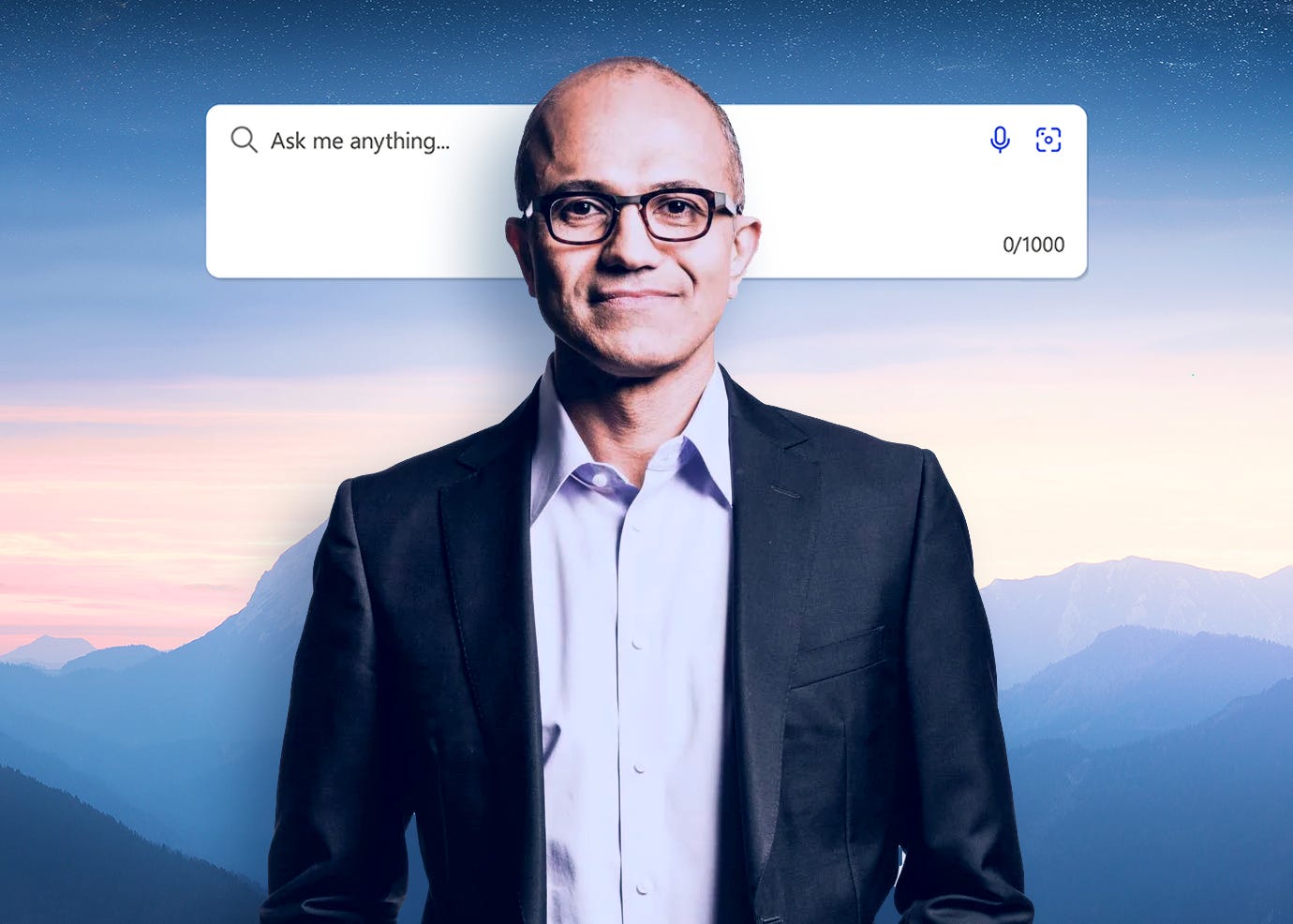Bing | Microsoft's A.I.-powered "Answer Engine"
Will "The New Bing" de-throne Google with their A.I.-powered search?
“It's not just a search engine, it's an answer engine.”
—Satya Nadella, interview with The Verge
This past week, Microsoft released “The New Bing” in a flurry of fanfare. Some are saying it’s the “Google-killer." Today, I’m gonna break down:
a short history of Google’s rise to search dominance (and why)
the strategic aces up each company’s sleeves
my thoughts on who’s going to win The Search Wars™.
Let’s get into it.
🔎 The Search Has Begun
Hand-crafted, artisan, grass-fed search
In 1994 when Yahoo! was started, there were only 2,738 web pages live on the internet and Yahoo! was just a collection of human-curated links, sorted by category.
By the time 1998 rolled around and Google was being built by a couple of nerds in a garage, Yahoo! wasn't just the dominant search engine for the internet, Yahoo! WAS the internet.
Over the next few years, however, the number of web pages on the internet didn't just trickle in. In the late 1990's and early 2000's, it was like someone opened the flood gates and the internet exploded into millions and millions of links which, as you might imagine, required a different sort of aggregation and categorization method than the hand-curated version Yahoo! was used to.
Algorithmic search
Larry and Sergey, the co-founders of Google, met in their PhD program at Stanford University and came up with a really innovative way to catalogue the internet automatically, keeping up with the rapid pace of the ever-growing number of web pages.
Within 3 years, Google became the dominant player, out-performing every other search engine by a mile.
In 2003, they introduced their first monetization product, Google AdWords. This was a powerful paradigm shift for the internet and advertising. Google was fielding 61,000,000,000 search queries a year. Queries that, by their very nature, revealed the intent of the user and allowed Google to pair the high-intent users with the businesses who offered a solution. For a fee, of course. It was a match made in digital heaven. Advertisers acquired customers. Customers found answers. Google made buckets of money.
The “Decision Engine”
Fast forward a few years to 2009 (I told you this was a quick history) and Microsoft finally catches up to the search game with their release of Bing. When it launched, they marketed it as a "decision engine" built to help users make educated decisions by "presenting search results in a more organized and visual way."
The only problem was that the search results weren't good at all. Bing was 11 years behind Google and didn't even make a dent in their market share.
DeepMind
In 2014, a little startup across the pond in London called DeepMind developed a machine learning system called AlphaGo. When it beats the reigning world champ of Go, the world went haywire wondering if the singularity was near. It didn't take long before Google snatched up DeepMind for a reported $500M and DeepMind continues to make incredible advancements in AI across the fields of gaming, biology, robotics and more.
Oddly, we never saw DeepMind integrated with Google's core search product in the splashy headline sort of way you would have imagined.
OpenAI
Around the time Google acquired DeepMind, a group of friends including heavy hitters like Reid Hoffman (PayPal, LinkedIn), Elon Musk (PayPal, Tesla, SpaceX), Peter Thiel (PayPal, Palantir), Greg Brockman (Stripe), Jessica Livingston (Y Combinator), and Sam Altman (Y Combinator), started an organization called OpenAI with the intent of building a safer, more responsible future for AI.
For 7 years they diligently built in silence, releasing papers and small wins along the way, flush with a $1B investment from Microsoft in 2019 that basically went unnoticed. OpenAI, DeepMind and others were pushing a large flywheel that had begun to spin. Slowly at first, but picking up speed with every rotation.
Today, the scale of the largest AI models are doubling every 6 months. This rate of progress is much faster than Moore's Law and the effects are rippling beyond the circle of super nerds.
On November 18, 2022, OpenAI released a little chatbot called ChatGPT. It was a natural language chatbot that was the first one that felt sorta-kinda human. I downplay it a little but don't let that fool you. It hit the tech scene like a tidal wave and reached 1,000,000 users in 5 days. Absolutely bonkers growth.
It wasn't long before everyone and their mom were releasing Twitter threads and LinkedIn posts about, "how to craft the perfect prompt for ChatGPT." I almost threw my phone in a lake that week.
Welcome to Making Product Sense
Join thousands of others like you, learning how to build great products and companies from world-class builders.
🎯 Ready... aim... fire.
But on January 23, 2023, Microsoft took careful aim at Google... and fired.
They announced Microsoft's new OpenAI-powered products.
"Perhaps the most salient part of today's announcement is we've had the best gain in relevance in the core rankings using some of these large models.
Second is, it's not just a search engine, it's an answer engine. We've always had answers but with these large models, the fidelity of the answers just gets so much better.
And then we've incorporated chat right into search which is grounded in search data so you can do work with natural language prompts, you get a great answer and then you can engage in a conversation with that as the grounding of the context.
It's about basically essentially bringing a more sophisticated model, larger model, next generation model compared to ChatGPT and grounding it in search data.
The last thing we added was a co-pilot for the web. In Edge, you can be looking at any website or any document on a website [...] and then do things like summarization."
—Satya Nadella, CEO of Microsoft, in an interview with The Verge
🚨 Code Red
After that announcement, Google calls a "Code Red" internally and the OG founders, Larry and Sergey, are called out of retirement and into the War Room.
Google's Code Red has caused many to speculate that Google is in panic mode, believing that Microsoft will begin to eat away at Google's market share. Here are some of the arguments I've seen:
1. Increased cost per query
Because Microsoft brought a new innovation to market that challenges the incumbents, those incumbents most likely will have to play Microsoft's game just to protect their market share and revenue.
This will force Google "to dance."
They'll now have to deploy a competing AI-search tool which currently requires more costly compute. So assuming 10-20% of their search volume is now using this more expensive search tool, it'll reduce their margins and eat into their profits.
2. Reduced ad visibility
"Sridhar Ramaswamy, who oversaw Google's ad team between 2013 and 2018, said ChatGPT could prevent users from clicking on Google links with ads, which generated $208 billion — 81% of Alphabet's overall revenue — in 2021, Insider reported."
—Business Insider, Google Management Issues Code Red
While it’s a bit too early to tell, there’s a really good chance that new monetization models will spring up in the wake of chat-based search.
These models are trained on content produced by companies who make money off of that content and have relied on search funneling traffic to them in return for creating high quality content. But if that content is extracted from their website and surfaced within a chat interface, the publishers don’t get their due. All of the revenue flows to the company with the answers which becomes the search companies.
And if they do stick with ads (which they'll have to for some period of time at least), it'll be incredibly important for Google to somehow be able to serve up ads within the AI responses in order to keep their ads business alive without muddying up the responses and causing users to not trust the answers they return.
While these two arguments make logical sense, I believe there are significant factors that are being ignored amidst the hype that lead me to believe Google isn’t in as much trouble as it might seem. Even if Google did nothing, it would take years for Bing to overcome Google's brand momentum and syphon away significant market share.
But let's be honest. Google's not doing nothing... you know, Code Red and all that. They're going to vigorously defend their position as king of the hill.
👑 King of the Hill
Let's take a look at some of the current market dynamics that I believe will swing the battle in favor of Google.
1. Current Search Engine Market Share
Google (92.9%)
Bing (3.03%)
The search market is basically a monopoly. I could just say "nuff said" and call it a day. But wait... there's more.
2. Owned Channels
Mobile Browsers (stats)
Chrome (65.35%) — Google owns it.
Edge (so tiny it doesn't even register) — Owned by Microsoft.
Safari (24.45%) — Google has a deal with Apple to be the default search engine.
Desktop Browsers (stats)
Chrome (66.39%) — Google owns it.
Edge (11.09%) — Owned by Microsoft.
Safari (9.33%) — Google has a deal with Apple to be the default search engine.
Google owns a majority of the browser market share with Chrome and can control that channel. But they also have a deal with Apple establishing them as the default search engine on Safari which is the second-largest browser.
While Google has Safari on lock for now, I guarantee you, Apple will be watching to see how everything shakes out and, if Bing proves to be the better experience, there's a chance Apple will be looking to renegotiate their deal.
If they do, that's an immediate 25% bump in mobile browser market share and 10% bump in desktop browser market share where Bing could become the standard. While that would be an incredible power play by Microsoft, the odds of that deal happening are still unseen and still wouldn't be enough to take down Google's dominance with Chrome.
3. Google’s long history in AI
Let's not be naive. Despite Google not throwing a "powered by AI" label on its ultra-minimal search bar, it most definitely is. Perhaps not the sort of AI that we see in ChatGPT, but AI nonetheless. Google has been a pioneer in the AI space for years and even re-oriented their entire company around it six years ago.
Remember DeepMind? That was just the AI stuff that everyone talked about because it had a consumer application: playing games. But Google's been working on powerful AI projects for a long time, including LLMs (large language models) and even invented the original Transformer models that OpenAI used as the basis for their research.
Here are some of their recent initiatives:
2018 — BERT: one of Google's first Transformer models to understand the intricacies of human language.
2021 — MUM: multi-lingual and 1,000 times more powerful than BERT.
2021 — LaMDA: a conversational language model that can engage in a free-flowing way about a seemingly endless number of topics
2022 — PaLM: a single model that could generalize across domains and tasks while being highly efficient
Despite what people say, Google hasn't been caught with its pants down. Spooked like a cat seeing a cucumber? Sure.
But It's been innovating at the forefront of AI for a long time and they’ll be quick to respond.
4. "Google it"
"Google" was one of the first tech companies to become a verb and it's literally in the dictionary. It's so engrained that even though I use DuckDuckGo, I still say "Google it." For all intents and purposes, "Google" means "search" in the zeitgeist.
20 years of being the dominant player builds consumers habits that are really hard to break, no matter how many ad dollars you throw at it.
5. Bing’s Baggage
Ah Bing... it was the brunt of so many memes.
Despite the rough history, they have an opportunity to be something more. My only fear is that they might not be. What everyone really wants is Google-level results, synthesized into a conversational response and served up in a chat interface. But what they might be getting is just Bing-level results with a chat interface. Only time will tell.
Take these next screenshots with a grain of salt (they came from Reddit) but this is the sort of off-the-rails, AI uprising sort of behavior folks are reporting 👀
🪩 The Dance-Off
This past week, Google answered Microsoft's challenge to dance with their release of Google Bard and Google Cloud's Generative Language API.
Google Bard
Bard is built on Google's LaMDA model and is being rolled out incrementally to users as they test it. Evidently there was some issues with the demo where it returned a factual error. After the demo, Google’s market value dropped by $100B. Ouch 😓
I haven’t used it so I can’t confirm how good it is, but just based off of the screenshots provided by Google like the one above, it doesn't look like it provides options to have an actual chat conversation with it. You can only select from pre-written follow up questions. So that basically makes it an animated, natural language version of the Featured Snippet which already exists.
While this first iteration of Bard is no doubt Google’s tourniquet to stop the bleeding, I guarantee you they have squads of Googlers working on Bard 2.0. For now, however, point goes to Microsoft.
I'm genuinely excited to see how it all plays out because the real winners at the end of the day will be the consumers. Searching the internet will never be the same again.
The definition of what constitutes "SEO friendly content” might change. Is “AI-friendly content” the next meta?
Search engines will likely begin to diversify their revenue away from advertising since including ads in the chat responses might feel more sleazy than simply a link on the page.
There will be new standards for AI-generated answers.
Anyway, who do you think’s gonna win? If you choose “other,” drop your prediction in the comments! Some are predicting it’ll be a third-party. Curious to hear your thoughts.
That’s all for this one - I’ll catch ya next week.
—Jacob ✌️
❤️ Smash that heart!
If you enjoyed this article, smash that heart icon to show some love! 🙏










